#vacine
Photo
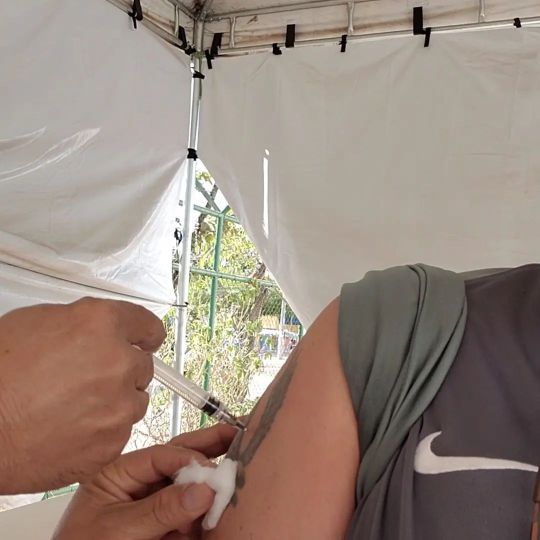
Quarta dose no corpo! Vacinação cruzada: antes Pfizer e hoje AstraZeneca. #vacine-se! (em São Sebastião, Distrito Federal, Brazil) https://www.instagram.com/p/Cf377XJOJFjzoYnSMU_Q-dkB8SP8qt0X9CxyN40/?igshid=NGJjMDIxMWI=
0 notes
Video
#vacine #stayhome #staysafe #quarantine#covid_19 #life #lifeisgood #lifequotes #lifestyle #lifehacks #people https://www.instagram.com/p/CdPNyorD26k/?igshid=NGJjMDIxMWI=
0 notes
Text
hatter days tomorrow hatterday is tomorrowhatterdayistomorrow hATTER DAY IS TOMORROWHATTER DAYS TOMorRoW hATTeR DAY is TOmroOW IT'S TOMORROW!!! IT'S TOMORROW THE HATTER DAY iS TOMoROW IT'S TOMORROW TOMORROW IS HATTERDAY
IT'S HATTER DAY TOMORROW

#blue speaks#RAUGUGHGA I'M GOING TO BE SHOOTING EVERYONE IN VACINITY WHO ROAMS THE TAGS I HOPE YOU KNOW
51 notes
·
View notes
Note
if you're still taking asks for shipping bingo, can you do kenman?









Wholesome cartman basically spoiling/looking out for Kenny what's not to love? plus Kenny could touch the TITS butters wasn't even allowed to stare thats true broship right there
.
#south park#kenman#kenny mccormick#cartman#if i felt better i could prob go into the vacine specia kenman moments it has bunches#cartman cares about kenny fandom is wrong to call kenny butters best friend
30 notes
·
View notes
Text
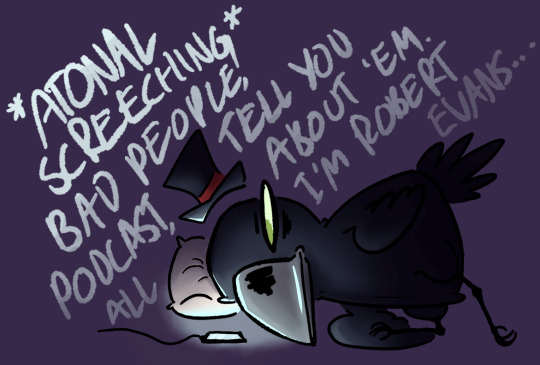
Greetings! It is I - Covid Corvid.
Dramatic string
Distant coughing
#corvid#covid#crow#behind the bastards#my art#second time catching covid#pretty mild this time thankfully#behind the bastards and slay the spire have kept me in the vague vacinity of sane
56 notes
·
View notes
Text
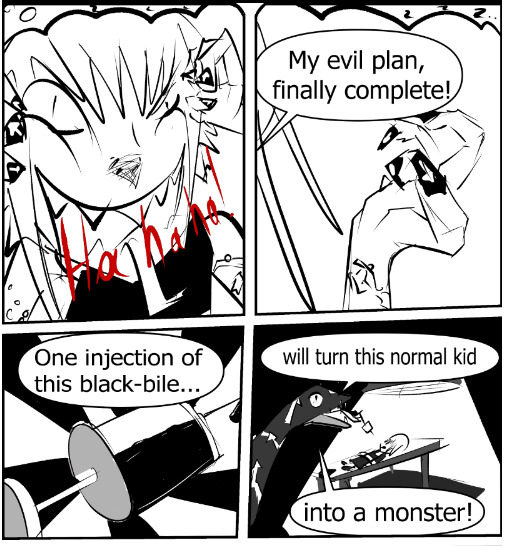
Nightmareish panels from Soul Eater post chapter 26
#soul eater post#soul eater#crona gorgon#Medusa gorgon#snake#and they say vacines are safe!#idk#I'm tired#you just find some funny caption idk#I really dont know#chapter 26#dreams
7 notes
·
View notes
Text
Going to markets these days is so depressing, like when I was a kid they were so vibrant and busy and had all these unique stalls and now it's just like cheap shit people have bought fron aliexpress but sell for stupid prices and the few slightly more decent stalls are all run by yuppies who /think/ they're hippies who get shit made in Bali and then sell it for absorbitant prices
Fuck off
#like lady youre not a hippie youre a rich bitch who doesnt vacinate her children has a beach front property and drives a 100k land rover#youre worse than a regular rich bitch bc at least they never would have gone to a market bc theyd think its povo#hate this shit
8 notes
·
View notes
Text
Had to explain to my mom last night that there is a huge difference when I pick my cat up between her "What the fuck? Leave me alone???" scream and her "Well, it's about GOD DAMN TIME YOU PICK ME UP" scream
#liz's personal tag#she's just a baby#all she does is scream at me#so i've had to become very good at figuring out which scream means what#i love her to death#if anything were to happen to her#i'd kill everyone in the immediate vacinity and then myself#i'd kill for her#i'd die for her#either way what bliss
7 notes
·
View notes
Text
sorry mutuals for being a nuisance on your dash.. in my defense wilbur soot is very hot and his smile is the sun the stars and when he wears that white button up and *i am shot 6 times consecutively in the forearm and euthanized*
34 notes
·
View notes
Text
I have to go to the doctors today
I no no wanna :,(
6 notes
·
View notes
Text
…
#im p sure ive talked about this on here before but ??#so year ago i saved a moth and ever since then moths love me#like im not even joking or exaggerating#like if one is in the vacinity i can hold out a finger and it will land on me#so anyways#told this to my coworker and they thought i was full of shit#and then a few hours later#A MOTH LITERALLY FLEW ONTO MY HAND WHILE WE WERE DOING PAPERWORK LMAO#💅#moth queen#i take pride in it to Like#i genuinely feel like if anyone tries to fuck w me a herd of moths will attack them
12 notes
·
View notes
Text
Obsessed with the fact that Nico was 13 planing an assassination on 18 years old Octavian
#freaking little prince of hades nico and every single pereon on the vacinity scared to dead of him except for 14 years old hazel#luna says#nico di angelo#octavian
19 notes
·
View notes
Text
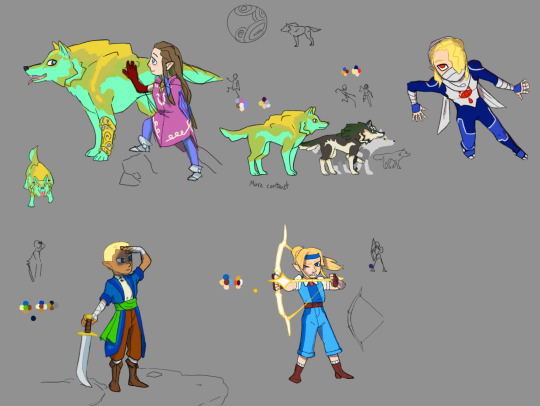



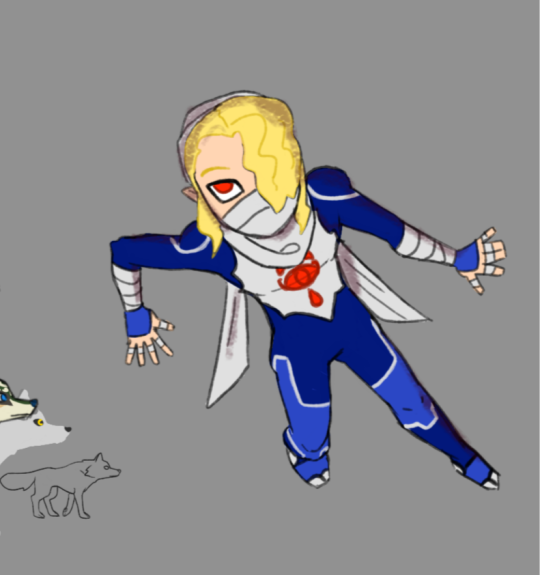
A zeldas meet au i like to play with (: i call it "*A* legend of zeldas" or, the alzs au for short
Heres a much more cluttered doodle page that mostly pertains to it.


#lunav draws#alzs au#in the same vacinity as links meet aus#zeldas meet au#tetra#zelda#wolf link#sheik#botw zelda#totk spoilers#tp zelda#trying very hard to cover all my bases but not over tag either#if im over tagging lemme know#quwu
12 notes
·
View notes
Text
First-Year Puppy Vaccinations
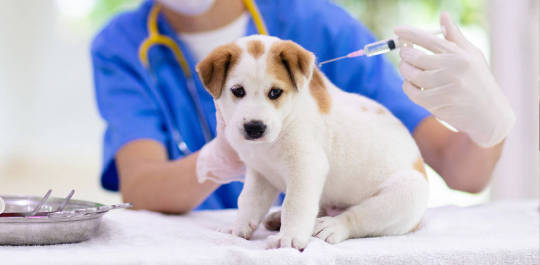
When you bring that fuzzy ball of puppy energy into your home, you know right away that your new puppy depends on you for, well, everything. It’s up to you to give your new puppy all the care they need every day. It can be a little intimidating — your puppy needs the best puppy food, plenty of attention, puppy training, puppy-safe toys, puppy socialization, a comfortable place to sleep, and proper veterinary care. And that includes making sure to schedule puppy shots throughout your puppy’s first year.
Which Shots Do Puppies Need?
Going to the vet over several months for a series of puppy vaccinations—and then for boosters or titers throughout your dog’s life—may seem inconvenient, but the diseases that vaccinations will shield our puppies and dogs from are dangerous, potentially deadly, and, thankfully, mostly preventable.
We read about so many different dog vaccinations, for so many different illnesses, that it can sometimes be confusing to know which vaccinations puppies need and which puppy shots are important but optional. Here is an overview of the diseases that puppy vaccinations will help your pet avoid.
Bordetella Bronchiseptica
This highly infectious bacterium causes severe fits of coughing, whooping, vomiting, and, in rare cases, seizures and death. It is the primary cause of kennel cough. There are injectable and nasal spray vaccines available.
If you plan on boarding your puppy in the future, attending group training classes, or using dog daycare services, often proof of this vaccination will usually be required.
Canine Distemper
A severe and contagious disease caused by a virus that attacks the respiratory, gastrointestinal (GI), and nervous systems of dogs, raccoons, skunks, and other animals, distemper spreads through airborne exposure (through sneezing or coughing) from an infected animal. The virus can also be transmitted by shared food and water bowls and equipment. It causes discharges from the eyes and nose, fever, coughing, vomiting, diarrhea, seizures, twitching, paralysis, and, often, death. This disease used to be known as “hard pad” because it causes the footpad to thicken and harden.
There is no cure for distemper. Treatment consists of supportive care and efforts to prevent secondary infections, control symptoms of vomiting, seizures and more. If the animal survives the symptoms, it is hoped that the dog’s immune system will have a chance to fight it off. Infected dogs can shed the virus for months.
Canine Hepatitis
Infectious canine hepatitis is a highly contagious viral infection that affects the liver, kidneys, spleen, lungs, and the eyes of the affected dog. This disease of the liver is caused by a virus that is unrelated to the human form of hepatitis. Symptoms range from a slight fever and congestion of the mucous membranes to vomiting, jaundice, stomach enlargement, and pain around the liver. Many dogs can overcome the mild form of the disease, but the severe form can kill. There is no cure, but doctors can treat the symptoms.
Canine Parainfluenza
This is one of several viruses that can contribute to kennel cough.
Coronavirus
The canine coronavirus is not the same virus that causes COVID-19 in people. COVID-19 is not thought to be a health threat to dogs, and there is no evidence it makes dogs sick. Canine coronavirus usually affects dogs’ gastrointestinal systems, though it can also cause respiratory infections. Signs include most GI symptoms, including loss of appetite, vomiting, and diarrhea. Doctors can keep a dog hydrated, warm, and comfortable, and help alleviate nausea, but no drug kills coronaviruses.
Heartworm
When your puppy is around 12-to-16 weeks, talk to your vet about starting a heartworm preventive medication. Though there is no vaccine for heartworm in dogs, it is preventable with regularly administered heartworm medication that your veterinarian will prescribe.
The name is descriptive — these worms lodge in the right side of the heart and the pulmonary arteries (that send blood to the lungs), though they can travel through the rest of the body and sometimes invade the liver and kidneys. The worms can grow to 14 inches long and, if clumped together, block and injure organs.
A new heartworm infection often causes no symptoms, though dogs in later stages of the disease may cough, become lethargic, lose their appetite or have difficulty breathing. Infected dogs may tire after mild exercise. Unlike most of the conditions listed here, which are passed by urine, feces, and other body fluids, heartworms are transmitted by mosquitoes. Therefore, diagnosis is made via a blood test and not a fecal exam.
Kennel Cough
Also known as infectious tracheobronchitis, kennel cough results from inflammation of the upper airways. It can be caused by bacterial, viral, or other infections, such as Bordetella and canine parainfluenza, and often involves multiple infections simultaneously. Usually, the disease is mild, causing bouts of harsh, dry coughing; sometimes it’s severe enough to spur retching and gagging, along with a loss of appetite. In rare cases, it can be deadly. It is easily spread between dogs kept close together, which is why it passes quickly through kennels. Antibiotics are usually not necessary, except in severe, chronic cases. Your vet may prescribe a dog-safe cough suppressant to help your dog (and you) get some rest, and some dog-safe throat soothers can help make a dog more comfortable.
Leptospirosis
Unlike most diseases on this list, Leptospirosis is caused by bacteria, and some dogs may show no symptoms at all. Leptospirosis can be found worldwide in soil and water. It is a zoonotic disease, meaning that it can be spread from animals to people. When symptoms do appear, they can include fever, vomiting, abdominal pain, diarrhea, loss of appetite, severe weakness and lethargy, stiffness, jaundice, muscle pain, infertility, kidney failure (with or without liver failure). Antibiotics are effective, and the sooner they are given, the better.
Lyme Disease
Unlike the famous “bull’s-eye” rash that people exposed to Lyme disease often spot, no such telltale symptom occurs in dogs. Lyme disease (or borreliosis) is an infectious, tick-borne disease caused by a type of bacteria called a spirochete. Transmitted via ticks, an infected dog often starts limping, his lymph nodes swell, his temperature rises, and he stops eating. The disease can affect his heart, kidney, and joints, among other things, or lead to neurological disorders if left untreated. If diagnosed quickly, a course of antibiotics is extremely helpful, though relapses can occur months or even years later.
Talk to your vet about when your puppy will be old enough for tick preventatives. Once your puppy is old enough, keep your dog on tick preventative medication, topicals, or wearables to help stop ticks from biting in the first place.
Parvovirus
Parvo is a highly contagious virus that affects all dogs, but unvaccinated dogs and puppies less than four months of age are at the most risk to contract it. The virus attacks the gastrointestinal system and creates a loss of appetite, vomiting, fever, and often severe, bloody diarrhea. Extreme dehydration can come on rapidly and kill a dog within 48-to-72 hours, so prompt veterinary attention is crucial. There is no cure, so keeping the dog hydrated and controlling the secondary symptoms can keep him going until his immune system beats the illness.
Rabies
Rabies is a viral disease of mammals that invades the central nervous system, causing headache, anxiety, hallucinations, excessive drooling, fear of water, paralysis, and death. It is most often transmitted through the bite of a rabid animal. Treatment within hours of infection is essential, otherwise, death is highly likely. Most states require regular rabies vaccinations. Check with your vet about rabies vaccination laws and requirements in your area.
Talk with your veterinarian about more information and guidance on necessary and optional vaccinations.
Puppy Vaccination Schedule
The first thing to know is that there is not just one puppy vaccination schedule for all dogs. Factors such as which part of the country you live in, and your dog’s individual risk factors will come into play. Some dogs do not need every vaccine. This decision is between you and your veterinarian. Always discuss puppy vaccinations at your regularly scheduled appointments.
That said, here is a generally accepted guideline of the puppy vaccination schedule for the first year.
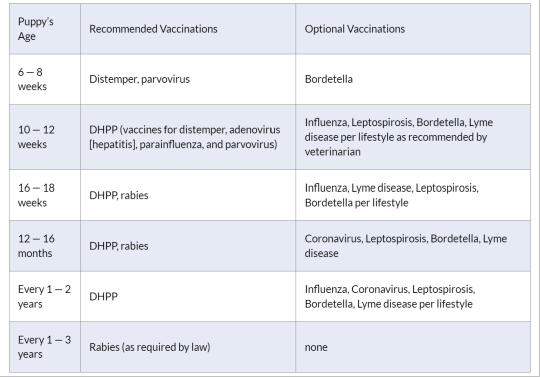
How Much Do Puppy Vaccinations Cost?
How much puppy vaccinations will cost depends on several factors. Where you live is a big one: Veterinarians in crowded and expensive urban areas will generally charge more than a rural vet in a small town. You may be able to find low-cost clinics providing rabies vaccinations sponsored by your local municipal government. But no matter what the range in costs, some vaccines, such as the “core vaccines” and rabies, are necessary.
The average cost can average around $75—100. These will include the core vaccines, which are administered in a series of three: at 6-, 12-, and 16 weeks old.
The core vaccines include the DHLPP (distemper, hepatitis, leptospirosis, parvo, and parainfluenza). Your pup will also need a rabies vaccination, which is usually around $15—20. (Some clinics include the cost of the rabies vaccination.)
Often animal shelters charge less for vaccines — approximately $20 — or are even free. If you acquired your dog from a shelter, he would most likely have been vaccinated, up until the age when you got him.
The initial puppy vaccination costs during the first year are higher than during adulthood.
Vaccinations for Adult Dogs: Boosters and Titers
There is a difference of opinion about having your adult dog vaccinated every year. Some vets believe too many vaccinations in adult dogs pose health risks. But others disagree, saying that yearly vaccinations will prevent dangerous diseases such as distemper. Talk with your vet to determine what kind of vaccination protocol works for you and your dog.
Many dog owners opt for titer tests before they administer annual vaccinations. Titer tests measure a dog’s immunity levels, and this can determine which, if any, vaccinations are necessary. One key exception to this is rabies: a titer test is not an option when it comes to the rabies vaccine. This vaccination is required by law across the United States. Your vet can tell you the schedule for your particular state, with boosters often lasting three years.
And it’s all worth it. For your effort and care your puppy will lavish you with lifelong love in return. This critical first year of her life is a fun and exciting time for both of you. As she grows physically, the wonderful bond between you will grow, too.
#puppy vacinations#puppy vaccines#puppy shots#puppy shots schedule#dog vaccinations#dog health#puppy health
4 notes
·
View notes

